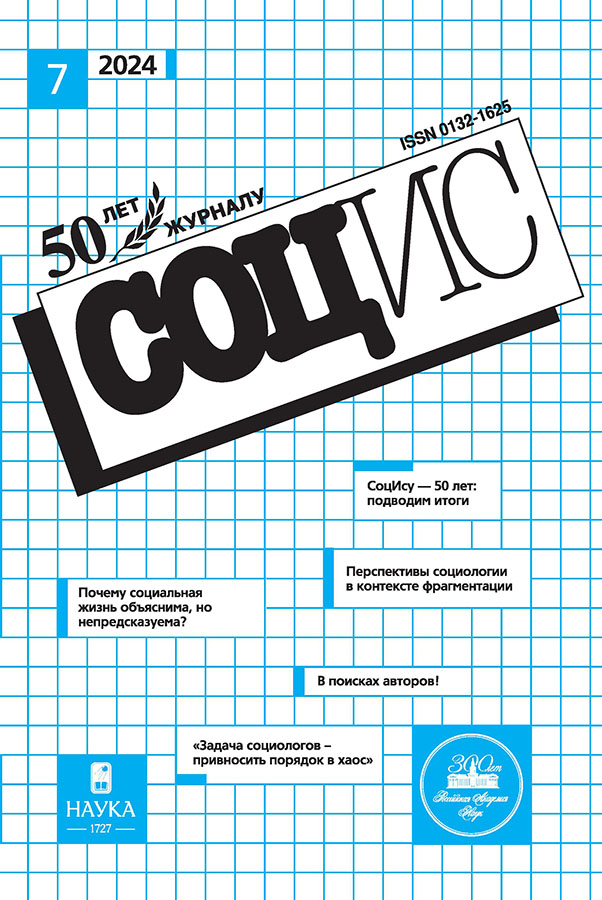Why is social life explicable, but unpredictable, or how does freedom give rise to determinism?
- Авторлар: Podvoyskiy D.G.1,2,3
-
Мекемелер:
- Lomonosov MSU
- RUDN University
- FCTAS RAS
- Шығарылым: № 7 (2024)
- Беттер: 159-169
- Бөлім: SOCIOLOGICAL JOURNALISM
- URL: https://clinpractice.ru/0132-1625/article/view/661807
- DOI: https://doi.org/10.31857/S0132162524070141
- ID: 661807
Дәйексөз келтіру
Аннотация
The article presents a critical reinterpretation and reconstruction of а key problem of social science: how a logically consistent and empirically substantiated explanation of social phenomena generated by the voluntarism of human actions, linked into complexes by a seemingly infinitely multiple contingency, is possible? In other words, we are talking about an attempt to answer the questions: how such a logically imaginary contingency is capable to generate elements of order at the empirical level, why social interactions have relative stability and reproducible character, what role do so-called unintended consequences of socially oriented (but dictated by «personal motives») human actions play in the processes of morphogenesis of society?
Толық мәтін
Авторлар туралы
Denis Podvoyskiy
Lomonosov MSU; RUDN University; FCTAS RAS
Хат алмасуға жауапты Автор.
Email: dpodvoiski@yandex.ru
Cand. Sci. (Philos.), Assoc. Prof., Assoc. Prof., Leading Researcher of the Institute of Sociology
Ресей, Moscow; Moscow; MoscowӘдебиет тізімі
- Durkheim E. (1991) The Rules of Sociological Method. In: The Division of Labour in Society. The Rules of Sociological Method. Moscow: Nauka. (In Russ.)
- Elias N. (2001) The Society of Individuals. Moscow: Praxis. (In Russ.)
- Momdjan K. H. et al. (2015) Nomothetic knowledge in social sciences and humanities. Epistemology & Philosophy of Science. No. 3: 16–53. (In Russ.)
- Montesquieu Ch.L. (1999) The Spirit of Laws. Moscow: Mysl. (In Russ.)
- Montesquieu Ch.L. (2002) Persian Letters. Considerations on the Causes of the Greatness of the Romans and their Decline. Moscow: Kanon-press-C, Kuchkovo pole. (In Russ.)
- Parsons T. (2000) The Structure of Social Action. Moscow: Akadem. Proekt. (In Russ.)
- Plekhanov G. V. (1956) On the Question of the Individual’s Role in History. In: Selected philosophical works in 5 vol. Vol. 2. Moscow: Gospolitizdat. (In Russ.)
- Popper K. R. (1992) The Open Society and Its Enemies. Vol. 1–2. Moscow: Fenix, MF «Kulturnaya iniciativa». (In Russ.)
- Popper K. R. (1993) The Poverty of Historicism. Moscow: Progress. (In Russ.)
- Rickert H. (1997) The Limits of Concept Formation in Natural Science: A Logical Introduction to the Historical Sciences. St. Petersburg: Nauka. (In Russ.)
- Rickert H. (1998) Science and History: A Critique of Positivist Epistemology. Moscow: Respublika. (In Russ.)
- Schutz A. (2004) Izbrannoe: Mir, svetjashchiysya smyslom [Selected works: A world glowing with meaning]. Moscow: ROSSPEN. (In Russ.)
- Weber M. (1990) Basic sociological concepts. In: Selected works. Moscow: Progress. (In Russ.)
- Windelband W. (1901) History and Natural Science. Moscow: Tov-vo tip. A. I. Mamontova. (In Russ.)
Қосымша файлдар









